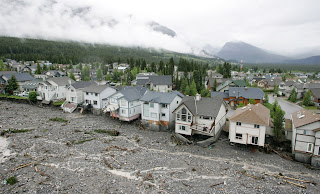Here's the Problem. What Do You Do With an Uninsurable House?
For most plebs their house is their home and their most valuable asset. It's their retirement nest egg. It's where they sink most of their disposable cash on improvements, redecorating, etc.
So, what happens when they discover that their house has become uninsurable? I guess "nothing good" isn't an adequate answer even if it is accurate.
Most home buyers depend on mortgage financing to fund the purchase price. Mortgage lenders come in several varieties but they have something in common - they want proof of insurance. They want to know that their loan is safe.
One of the insurers I follow is Munich Re. They're actually a re-insurer. Insurance companies use re-insurers to offload some of their risk. Who knows, maybe they've got a piece of your action.
In 2018, Munich Re dropped a bombshell. Climate change could push insurance premiums beyond the reach of some homeowners.
Ernest Rauch, Munich Re's chief climatologist put it bluntly:“If the risk from wildfires, flooding, storms or hail is increasing then the only sustainable option we have is to adjust our risk prices accordingly. In the long run it might become a social issue,” he said after Munich Re published a report into climate change’s impact on wildfires. “Affordability is so critical [because] some people on low and average incomes in some regions will no longer be able to buy insurance.”
If insurance premiums soar that cuts into the amount of money a purchaser can afford to pay for your house. If insurance becomes unavailable, the amount of money your house is worth can become negligible. Either way, it's a "social issue" to be sure.
“If you look at how destructive oil sands can be, there’s a very strong rationale,” Armando Senra, head of BlackRock’s iShares Americas funds, said in an interview, saying that Alberta’s oil fields, along with coal, are “the worst offenders, if you want, from a climate perspective.”
The new policy imposes a one-year moratorium, preventing insurers from dropping customers in or alongside ZIP codes struck by recent wildfires. The moratorium covers at least 800,000 homes around the state. The state has also asked insurers to voluntarily stop dropping customers anywhere in California because of fire risk for one year.
“People are losing insurance even after decades with the same company and no history of filing claims,” Ricardo Lara, California’s insurance commissioner, said in a statement. “Hitting the pause button on issuing non-renewals due to wildfire risk will help California’s insurance market stabilize and give us time to work together on lasting solutions.”
...After two years of extreme losses, it is clear that California’s insurers are struggling to prepare themselves for a new era of accelerating climate risk, according to interviews with insurance executives, academics and regulators. New research shows that the wildfires of 2017 and 2018 alone wiped out a full quarter-century of the industry’s profits. Last year’s Camp Fire was the costliest disaster anywhere in the world that year, according to the insurer Munich Re.


If a governmental department can demand taxes from any property then it should provide the safety net for it's existence.
ReplyDeleteLocal governments have placed taxpaying home owners in a difficult situation in their lust for growth.
The days of the speculative developer should be numbered!
TB
I agree that developers and land speculators need to be reined in and residential real estate treated as more than just a commodity of trade but governments can't indemnify homeowners for recurrent problems such as flooding. A one-off thing, perhaps. Here's X per cent of the value of your home to get you started again somewhere else. Now sign the land over to us so it can be properly designated as flood zone and off limits to development.
DeleteOne kick at the cat per customer. This is our new reality. We don't like it either.